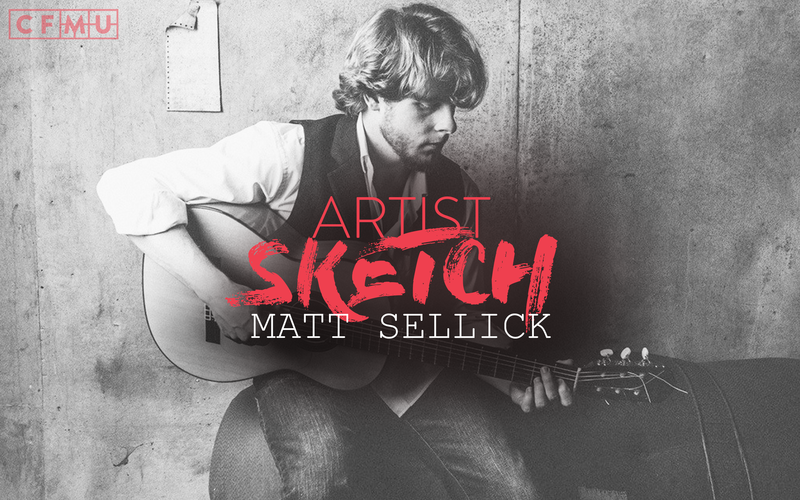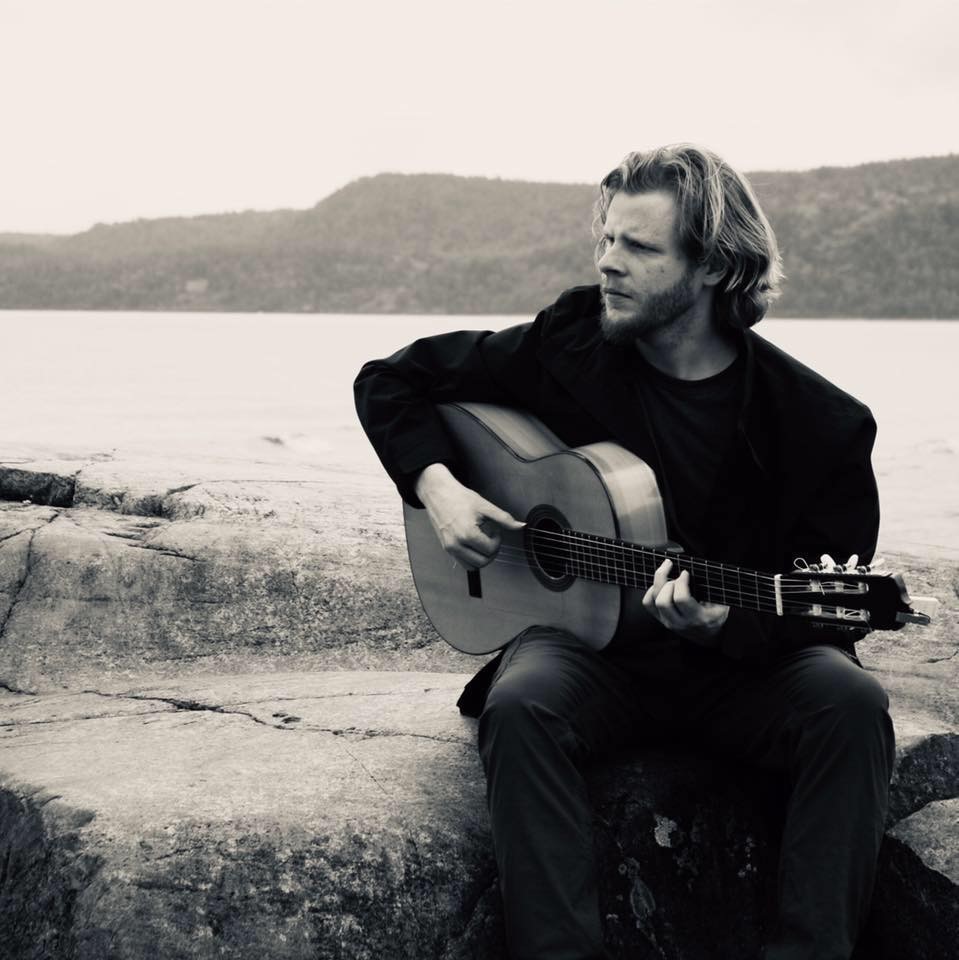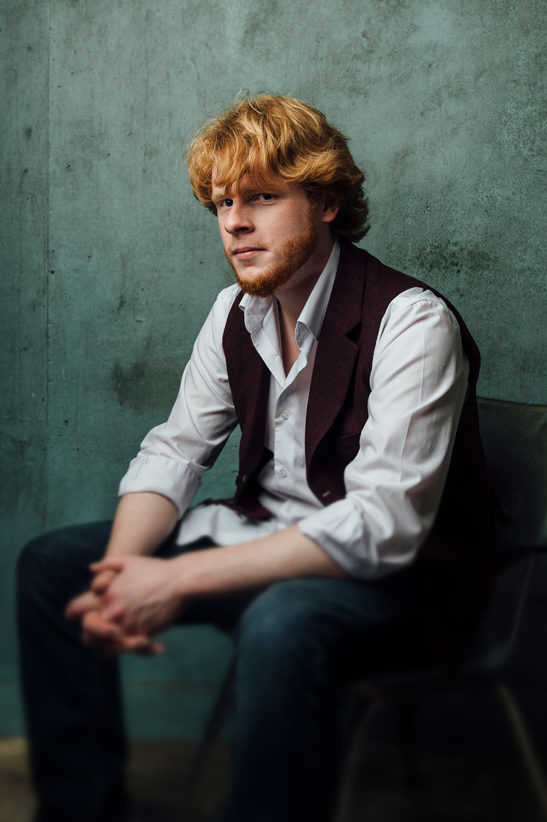A little less brain, a little more heart: Matt Sellick - CFMU Artist Sketch
Photo by Dave Andrew Photography
At first it was in the service of my dreams, and it overwhelmed me, but now it’s become part of who I am.
Working on this Artist Sketch has been a wonderful affair from start to finish for me.
Having childhood roots in the Thunder Bay area, I felt a flash of nostalgic recognition seeing TBay represented in our new releases. Not only that, but playing my first classical nylon-string guitar beside various brooks, waterfalls, and lakes was how I fell irrevocably in love with the act of making music. Recording studios and concert halls have their domain, of course, but an entirely new world of potential exists for music given free rein to converse with the wilderness – or so I have always felt.
Naturally, then, an flamenco album recorded entirely on the shores of Lake Superior – hence the album title, North Shore – was of immense personal appeal to me. But, clearly, I’m not the only one here at CFMU feeling that way; North Shore peaked at #21 on our Top 30 charts last week, moving steadily up from its start at #30.
With that in mind, I reached out to the artist himself with questions about the unconventional recording process behind the album, the companion blog that documents it, and his choice of flamenco as a genre. The challenge wasn’t in coming up with questions, but in limiting them for the sake of brevity. In any case, I sincerely hope this latest installment of Artist Sketch is as enjoyable to read as it was for me to put together.
Olivia out!
Guitar as an instrument is highly tactile and involved; from the press of fingers on strings to the stretch of the hand and arm, it is an instrument of sensation. How do you think having the guitar as your instrument of choice has shaped your perception of music?
That’s a good way to put it! I often joke that the guitar feels like an extension of my body, or that I feel “incomplete” without it. It responds to the energy you put into it and you can physically feel the sound that comes out of it.
I’d say that being a guitarist, even of such a specific genre as flamenco, has opened my ears to kinds of music I might not have otherwise listened to. It’s such a versatile instrument, and used so widely, that if I find a piece of music with a guitar part, that’s something I can understand and can latch onto. Something to hold my attention while I give the whole piece a chance to move me. There are a few styles I’ve come to really appreciate this way: Progressive rock, blues, jazz, metal ...
Guitarists often wistfully recall their first guitar. Is there a memory you have from learning to play that holds particular sentimental value for you?
I have a few memories fitting that description, but one that really stands out was learning to play Classical Gas. I was maybe 12 or 13. For the first time, I’d found a song that was both really challenging and also one that I really wanted to learn. I worked really hard and got the whole thing memorized in a week. Of course I couldn’t play it well at first, but after that I felt motivated, and more confident. I played it for my first ever cafe gig. I started trying to learn Jesse Cook, and Mark Knopfler, then Roland Dyens, and even later Paco de Lucía and Vicente Amigo. I was motivated to find pieces that made me work hard for the reward of being able to play them. It taught me that the pieces you can’t play, because they’re “too hard for you”, are the ones you need to try if you really want to get better.
...The pieces you can’t play, because they’re “too hard for you”, are the ones you need to try if you really want to get better.
What was it that drew you to flamenco, specifically, over other guitar-focused genres of music? How has the flamenco style impacted your career as a musician?
Flamenco has different priorities from the other styles I had tried. There’s an emphasis on rhythmic creativity, power of expression, and extremes in dynamics. I love that you can throw in the weirdest harmonies and the most complex rhythms, and it’s all fair game as long as you don’t lose the groove. Rhythm is everything. I also found the focus on the percussive qualities of the instrument — even at the expense of the “refined” qualities of the sound — to be refreshing after years of classical technique. There were also so many techniques to learn! Alzapúa, complex rasgueados, a harder tremolo ... these were all new tools of expression for me, and I just got so excited.
And it was hard! I loved it. Ten years into flamenco and most days I still feel like I have no idea what I’m doing yet. But it felt less like being “drawn to it” than falling face-first into it. I think my turning point, between classical and flamenco, was finding an old 1970s video of Paco de Lucía. I just thought, “well, this is what I’m doing with my life now”. Studying and performing flamenco got me used to doing things, going places, meeting people, that I’d otherwise never have done. I had to go to Spain to study, and had to start going to larger centres like Toronto and Montreal to find other flamenco artists to work with. At first it was in the service of my dreams, and it overwhelmed me, but now it’s become part of who I am.
Flamenco’s very niche, but audiences fall in love with it very quickly, and they get hooked. Then they start keeping an eye out for flamenco events wherever they are. It’s easier to stand out in flamenco than in a more mainstream genre. At least that’s been my experience!
LISTEN: Thunder Bay-based guitarist Matt Sellick's latest project, North Shore
Do you have any particular go-to inspirations for making music? Certain works of art, movies, books, stories, or more abstract things like colours, moods, or sensations?
Definitely all of the above! But my default is to start with a mood. Flamenco is great that way. It’s organized into forms that have a mood already associated with them. Soleá evokes solitude, Siguiriya evokes grief, Alegrías evokes joy ... you get the idea. I like to play around and find unusual chord shapes that fit the mood I’ve chosen, then work them into a structure for the defining moments in the song. The title comes last — I often try to pick the name of a place where I’ve felt the emotions the song elicits.
But all those things you suggested can be great inspirations for me. North Shore was directly inspired by the atmosphere of Lake Superior’s shoreline. Of course the Group of Seven’s north shore artwork was something of an inspiration as well. I didn’t want my work to directly “retread” their steps, but it was impossible for that not to be on my mind. I found some of their sketching locations and wondered if the imagery meant the same things to them as it does to me.
I’m sure the books I was reading worked their moods in there, too. I was on a Neil Gaiman kick at the time. One of my best friends, Claudia, is a writer, and we have a habit of sending each other snippets of work to inspire each other.
Of course the Group of Seven's north shore artwork was something of an inspiration as well.
You travelled through Ontario’s provincial parks while recording North Shore. What, fundamentally, set this apart from recording in a studio for you? How do you think this unconventional recording style impacted the album?
The biggest difference for me was the shift in what I prioritized about the production. Working natural ambience into the recordings was an exercise in compromise. It would have waves, some birds, the occasional wind pop. I couldn’t “produce” it to the point of audio perfection without sacrificing the element that made this album special in the first place.
Also, the time constraint and travel meant that I had to commit to ideas quickly, and that maybe I wouldn’t find the “perfect version” of every lick I made up. I couldn’t take the time to refine every idea. I’ve never felt like I could allow myself to do that before — saying “that’s good, move along” felt really good. And it definitely makes the music different from my previous work. I could say it’s a little less brain, a little more heart.
This was also the first I’ve had a specific inspiration or concept for an album. For my older work, I would often have to really go looking for something to “write” about. More often, I’d just sit down and write snippets of melodies and progressions until I found things I liked and strung them together. Like crafting with scraps of materials you find lying around. Not a bad process, and I think it’s important to your craft to be able to be productive even when the cliché “spark” of inspiration refuses to show up to work with you. But this time, the inspiration was right in front of me the whole time, and the whole process - despite the unusual locations and daily routine - was very smooth and efficient.
[The recordings] would have waves, some birds, the occasional wind pop. I couldn’t “produce” it to the point of audio perfection without sacrificing the element that made this album special in the first place.
You gave yourself a time constraint of seven weeks to write and record the album. Some musicians argue that time constraints are limiting; others say they are stimulating. What was your experience?
Yeah! It was arbitrary, but I just thought “that should be enough time to do what I want to do”. I was afraid that if I spent more time than that camping by myself, I might get really lonely. Or become a hermit.
I had been so used to not having time constraints for composition. If you’d asked me a year ago, my answer would have been “time constraints are limiting”, but now I can honestly say I find them stimulating. I wanted a writing process where I couldn’t indulge overthinking, and would have to rely more on quick decisions about what I liked.
On my first day on the project I was suddenly unsure if I could do it. But three days in I had a whole song. A week in I had two. Before long I just relaxed into the writing routine. I felt some pressure, sure, but when I came around again and realized I could do it, it was amazing. I got through the dry spells without frustration, and that made all the difference.
You wrote a highly detailed blog even while you were busy developing the album. Why was that level of transparency important to you – for connecting to your fans, for posterity, or something else?
I think it was a way of feeling connected to the world while I was away. I really enjoy quiet and solitude (I’m honestly quite the introvert), but to suddenly be so isolated from my friends, family, and city for two months was a bit of a shock, as much as I really loved what I was getting to do. Writing for the blog alleviated this a bit. The original plan was to write “when I felt like it”, but it quickly became a daily routine that I looked forward to!
Writing the blog also helped motivate me to think about what I was doing, and why. What did I want to say with the album? What was it about these places I wanted to convey in music? Having the excuse to get those words down and document what I was doing helped me organize my thoughts and emotions.
I was afraid that if I spent more time than [seven weeks] camping by myself, I might get really lonely. Or become a hermit.
If you had to choose, who is the one musician you would collaborate on an album with?
If I could choose anyone?! I feel like I should choose one of my favourite flamenco guitarists. Or a flamenco singer! There are so many incredible singers right now. I would love to make a flamenco cante (singing) album, just guitar and vocals. But if I could pick literally anyone, well ... I’d love to try a collaboration with Mark Knopfler. I’ve always especially admired his soundtracks (Local Hero, Princess Bride, Cal, etc.), and how he’s able to adapt his guitar to so many different styles. I actually recorded a cover of his theme from Local Hero, and I thought of putting it on my first album. But I’m still saving it. I guess I have some fantasy that our playing could be compatible! You never know.
...You never know, indeed! If you liked this Artist Sketch, head over to Matt Sellick's Facebook and Twitter for updates, and his YouTube channel to see him in action. (If you're a Zelda fan, there's something there you might like...just saying!)
Olivia Fava is a newly graduated linguistics student and the Community Outreach Coordinator at 93.3 CFMU. She hosts MorningFile as well as Rainbow Radio, a celebration of LGBTQ+ music airing every Monday night from 7-8. She is a dedicated songwriter and guitarist with a love of jazz, bossa nova, and all things smooth.


